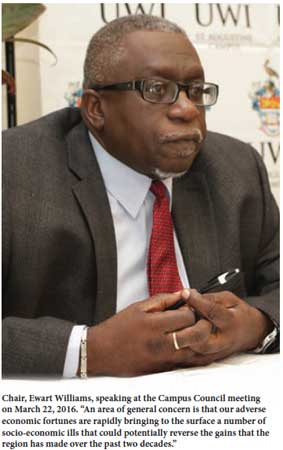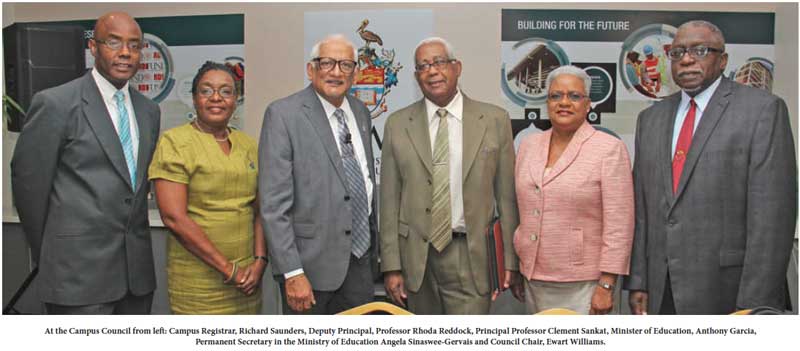
 The year under review has indeed been a very challenging one. The Campus continued to record impressive progress towards several of the important objectives of our 2012-2017 Strategic Plan; and we demonstrated an ability to adapt to the rapidly changing circumstances … but it was a challenging year, nonetheless. The year under review has indeed been a very challenging one. The Campus continued to record impressive progress towards several of the important objectives of our 2012-2017 Strategic Plan; and we demonstrated an ability to adapt to the rapidly changing circumstances … but it was a challenging year, nonetheless.
For the past several years many of our contributing Governments have been facing difficult economic circumstances, which have impacted their ability to meet their obligations to the Campus. The decline in oil and gas prices beginning in late 2014 has had a dramatic effect on the local economy and on the Government finances and the effects of this are now beginning to be felt by the Campus.
The year under review saw a second consecutive year of enrollment decline, this time affecting both under-graduate and post-graduate students. This fiscal year also saw a sizable deficit in the Campus finances, due mainly to the need to provide for the impairment of receivables from contributing Governments. The financial squeeze has intensified during the current fiscal year, and I will say a bit more about that later.
But challenges bring out the best in us and this one was no different: for one thing, it forced a consolidation of some programmes and raised the bar for new qualifying programmes; it increased the urgency for diversifying our funding sources and it motivated the Campus to search for new and innovative ways for partnering with the private sector to fund large infrastructural projects.
In terms of our many successes, I would like to single out our unwavering focus on improving teaching and learning, on the expansion of post-graduate programmes of particular relevance to national and regional development needs and the new initiatives to substantially enhance the student experience and student community involvement.
An area of general concern is that our adverse economic fortunes are rapidly bringing to the surface a number of socio-economic ills that could potentially reverse the gains that the region has made over the past two decades. Our remit requires that our University provide needed support to the regional community. In my respectful view, the current situation presents unique opportunities for intensified collaboration between the University and our regional governments as they seek to the find solutions to these pressing problems. And we are uniquely qualified to help.
In the case of Trinidad and Tobago, for instance, it is widely agreed that economic diversification is now an urgent necessity. But isn’t UWI, St. Augustine the seat of the Faculty of Food and Agriculture and haven’t we recently launched a new Agricultural Innovation Park? We certainly have much to offer to further the cause of agricultural development. We are also very well placed to promote a better alignment of academic research, innovation and entrepreneurship in the industrial and service sectors. This type of collaboration has been cited as one of the important factors in the successes of the more dynamic Asian economies.
And as regards the social sectors, are we satisfied with our input in ongoing efforts to deal with the spate of crime throughout the region; with the quality of primary and secondary education; with the regional gender policy (including the proliferation of gender-based violence; and then there is the burning issue of the sustainable financing of tertiary education.
If we are not playing a major role in solving these problems, perhaps it’s because we have not been formally asked… in which case, my answer would be… let’s not wait to be asked let’s go out and OFFER our services.
Let’s show that we can contribute to the solutions.

Mr. Ewart Williams is the chair of the Campus Council of The UWI St. Augustine Campus. These are his opening remarks at the meeting of the Council held on March 22, 2016 in St. Augustine. The Annual Report, presented at the Council meeting, can be found at: http://sta.uwi.edu/news/reports/default.asp |





